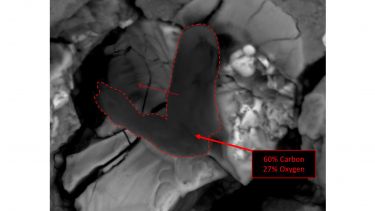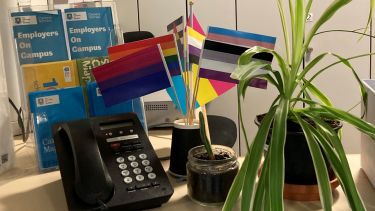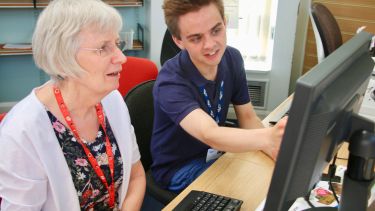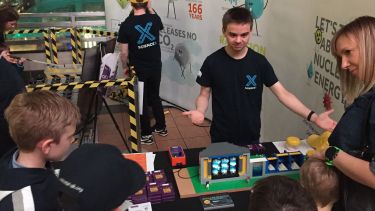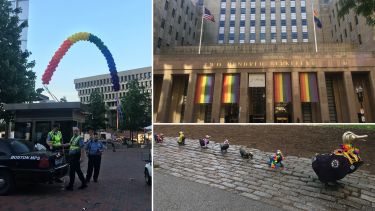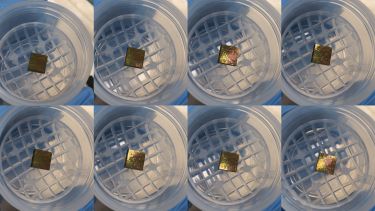I’ve studied in lots of unis/departments, but I’ve found this department in Sheffield to be the warmest and most welcoming of the lot!
Name:
James Mansfield (@JamesTmansfield if you want to follow me on twitter! ?). Also, my pronouns are he/him, please.
Position:
Postgraduate Researcher/PhD Student ?
Area of work:
I study how glass dissolves over pretty long timescales! Or, as I sometimes like to say, my research is all about “Long-term Glass Behaviour Testing In Action + some other stuff (LGBTQIA+ ??)”
I appreciate that glass dissolution doesn’t sound particularly interesting, but it really is!!! And it's also really important because the UK plans to put its radioactive waste (potentially pretty dangerous stuff!) into a solid block of glass before burying this deep underground. But before we get carried away and do any of this, it's really important that we make sure that none of this waste will dissolve out of the glass if it ever gets wet... and that's exactly what I do! I try to learn as much as possible about how glass dissolves by looking at really old glass (from castles that were set on fire 2,500 years ago!) and glass that I’ve made and dissolved myself in the lab!
What’s you background?
Before starting my PhD, I did a BSc. in Earth Sciences at The University of Glasgow. Whilst there I got up to all sorts of fun things: I buried a teabag in a plant pot to research how minerals dissolve, I learned how to identify a rock just by the sound or smell it made when hit by a hammer, and I even thought I found an alien whilst looking at an actual Martian meteorite ?!
Anyway, after that I did an MSc. in Geophysical Hazards at University College London. I had loads of fun there too: I saw with my own eyes the power of our planet whilst visiting Pompeii and I also visited an active volcano (it smelt pretty bad and I was in tears the whole time because apparently, I’m allergic to volcanoes ?…)
After all of that I came here, to Sheffield, to start another fun journey: My PhD.
What inspired or motivates you to work in that area?
Fairly simple answer here… I just want to help people using the things I enjoy most: science and education! I guess the fancy-pants answer to this question can be found in the cover letter I submitted alongside my PhD application…
“I [am] motivated by an enthusiasm to apply scientific research to minimising societal risk” ?
Or, put in more simple terms,
“I just want to help people and have fun doing it” ?
I know that science has the power to save and improve millions of lives, making the world a better place for everyone... And I want to be part of this! That’s why I used to study Earth’s most deadly natural processes, because I wanted to know how we can help people to prepare for and respond to these. And that’s why I hope my current research will contribute towards ensuring that future societies are not put at risk by our method of nuclear waste disposal.
What are your experiences of working in the department?
I’ve studied in lots of unis/departments, but I’ve found this department in Sheffield to be the warmest and most welcoming of the lot! Everyone here just seems really friendly and welcoming and there’s oodles of support available.
The atmosphere towards LGBTQ+ people (which I guess is maybe what I’m here to talk about…) is particularly friendly and I think this is thanks to the little things that people do: It’s the pronouns in people's email signatures, the little pride flags that some staff have on their doors, the array of diversity flags and friendly face you see every time you walk into the building, or just the little chats you have with people as you pass them in the corridor… It’s the little things that these allies do on a daily basis which help many of us LGBTQIA+ folk feel comfortable. ?
Do you get involved in any activities outside the Department?
I used to really enjoy running, because Sheffield has the best hills to run up! The Sheffield Half Marathon, for example, has a whopper of a hill in the middle! The only problem is that I recently injured my knee whilst running down a hill with rather too much enthusiasm ?! So nowadays I mainly just go walking through Sheffield’s lovely green spaces instead.
I also enjoy volunteering for AgeUK Sheffield, where I help older people to get to grips with technology. I know a lot of people find it frustrating when you have to explain to your grandparents for the 7000th time how to send a text message, but for some reason I quite enjoy this! I’m quite happy to spend two hours going over and over “how to phone someone” if that’s how someone living with dementia learns best!
I also like communicating science to the wider public. Pre-Covid, myself and many other researchers used to go to local venues and chat about science with people. I particularly enjoy talking to youngsters: they’re often the most interested and the most enthusiastic to learn. Children also often have the best questions (although I honestly don’t know what nuclear waste tastes like… ?). As well as this, I also give talks at events which aim to promote the visibility of LGBTQIA+ people in STEM. A few years ago, I spoke at a Pride in STEM event in Sheffield and this year I spoke about what “Flaming Scottish castles and rainbows have got to do with nuclear waste disposal” at an online event. Speaking like that is something I’ve grown to enjoy.
Have you ever been to a Pride event before?
Not really, no – I have stumbled across some by accident though!
Whilst I was studying in London I remember getting on ‘The Tube’ and seeing all of amazing brightly-dressed people heading to/from Pride ?. I remember that they looked amazing and they seemed to be having such a good time just being themselves. I recall having to stop myself staring at them too much in case they thought that I was somehow judging them… I wasn’t doing that at all! I was just bamboozled by their vibrancy and amazed at how comfortable they were just being themselves. This was before I was ‘out’. Before I was OK being me.
Then, a few years ago I went to a conference in Boston (Texas) and we must have arrived in the middle of Pride because the city was adorned with rainbows and colour (even the local ducklings donned suitably flamboyant accessories!) I thought it all looked jolly fun, but I didn’t really have time to join in. If you ever see the little Pride flag that’s behind me in most ‘Zoom’ calls… that’s from Boston: I rescued it off the pavement once everyone else had left. It didn’t look ready to go to landfill - so I thought I’d give it a second life.
What are you doing to mark Pride this year?
Even if there was a huge Pride event happening in Sheffield this year, I’m not sure that I’d go. They’re perhaps too loud and busy for my simple little mind. But that doesn’t mean I can’t do something else instead…? ? Maybe I’ll just try and appreciate the colour and beauty around me? I know that sounds super-cliché, but it’s the vibrancy, energy and colourfulness of Pride that I enjoy most - and I’m sure nature can offer just as much of that if we just stop and look! I’m also lucky enough to see some of this beauty in my research, too! Look, for example, at what happens to my boring colourless glass if you dissolve it in water for just over a year! ?
Has being LGBTQIA+ ever affected your work?
Being part of the LGBTQIA+ community has probably benefitted my studies in some ways. Firstly, it has given me something else to be passionate about – something to apply myself to other than my research and this can’t be a bad thing, surely?! Second, the support and encouragement of the LGBTQIA+ community has motivated me to continue investigating a specific line of enquiry within my research. Studying glasses from ancient Scottish castles was never intended to be part of my PhD, and it only really grew to be thanks to the encouragement and interest shown in this topic by members of the LGBTQIA+ community when I presented it to them at a diversity event in 2018.
But not all of the effects, or potential effects, have been positive. The lack of role models isn’t ideal: throughout my nine years of university, not a single one of my lecturers has been openly LGBTQIA+ (that I know of, at least…) and this lack of representation perhaps made me question whether academia was right for me. Maybe it still does, a little? Being LGBTQIA+ also effects which conferences I can go to. Or, at least which ones I am comfortable going to. This is because some of the conferences I look to go to are held in countries where being LGBTQI+ is illegal (even punishable by death!). In some places even just expressing your support for the LGBTQIA+ community is punishable with jail time. I wouldn’t feel safe visiting anywhere like this: Not for a conference or any other reason.
Pride month offers us a time to reflect on all of these things: Both how far we’ve come (who could have imagined 50 years ago that being LGBTQIA+ could have a positive impact on your work?!), but also how far we’ve still got to go (wouldn’t it be great if everyone could just feel happy being themselves, whoever they are, and wherever they are in the world?!)
What are your future plans?
Scary question! ? In terms of the PhD, I’ve got a few more experiments I need to finish and then apparently I need to write a thesis (don’t worry, though… I’ve got a plan to sneak some emojis into this too ?) In terms of all the other “life stuff” I’ve spoken about: I’d love to run at least one full marathon before I’m 30, I’m branching out to help AgeUK with their social media now too, and I’d love to help deliver some public science communication events to mark The UN International Year Of Glass next year.
After all of this?... Who knows? Maybe I’ll continue helping to answer big questions through research? Maybe I’ll turn my hand to helping others to do this, instead? Maybe I’ll help the public to understand science and technology? I don’t really know! But what I do know is that I want to continue helping people whilst having fun ?.
